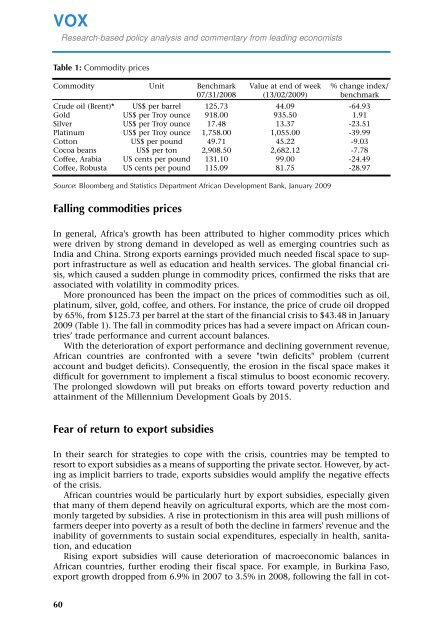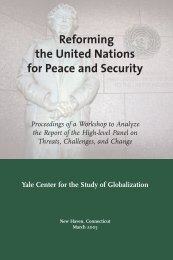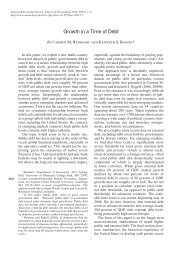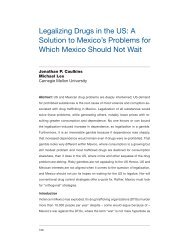The collapse of global trade, murky protectionism, and the crisis:
The collapse of global trade, murky protectionism, and the crisis:
The collapse of global trade, murky protectionism, and the crisis:
Create successful ePaper yourself
Turn your PDF publications into a flip-book with our unique Google optimized e-Paper software.
VOX<br />
Research-based policy analysis <strong>and</strong> commentary from leading economists<br />
Table 1: Commodity prices<br />
Commodity Unit Benchmark Value at end <strong>of</strong> week % change index/<br />
07/31/2008 (13/02/2009) benchmark<br />
Crude oil (Brent)* US$ per barrel 125.73 44.09 -64.93<br />
Gold US$ per Troy ounce 918.00 935.50 1.91<br />
Silver US$ per Troy ounce 17.48 13.37 -23.51<br />
Platinum US$ per Troy ounce 1,758.00 1,055.00 -39.99<br />
Cotton US$ per pound 49.71 45.22 -9.03<br />
Cocoa beans US$ per ton 2,908.50 2,682.12 -7.78<br />
C<strong>of</strong>fee, Arabia US cents per pound 131.10 99.00 -24.49<br />
C<strong>of</strong>fee, Robusta US cents per pound 115.09 81.75 -28.97<br />
Source: Bloomberg <strong>and</strong> Statistics Department African Development Bank, January 2009<br />
Falling commodities prices<br />
In general, Africa's growth has been attributed to higher commodity prices which<br />
were driven by strong dem<strong>and</strong> in developed as well as emerging countries such as<br />
India <strong>and</strong> China. Strong exports earnings provided much needed fiscal space to support<br />
infrastructure as well as education <strong>and</strong> health services. <strong>The</strong> <strong>global</strong> financial <strong>crisis</strong>,<br />
which caused a sudden plunge in commodity prices, confirmed <strong>the</strong> risks that are<br />
associated with volatility in commodity prices.<br />
More pronounced has been <strong>the</strong> impact on <strong>the</strong> prices <strong>of</strong> commodities such as oil,<br />
platinum, silver, gold, c<strong>of</strong>fee, <strong>and</strong> o<strong>the</strong>rs. For instance, <strong>the</strong> price <strong>of</strong> crude oil dropped<br />
by 65%, from $125.73 per barrel at <strong>the</strong> start <strong>of</strong> <strong>the</strong> financial <strong>crisis</strong> to $43.48 in January<br />
2009 (Table 1). <strong>The</strong> fall in commodity prices has had a severe impact on African countries’<br />
<strong>trade</strong> performance <strong>and</strong> current account balances.<br />
With <strong>the</strong> deterioration <strong>of</strong> export performance <strong>and</strong> declining government revenue,<br />
African countries are confronted with a severe "twin deficits" problem (current<br />
account <strong>and</strong> budget deficits). Consequently, <strong>the</strong> erosion in <strong>the</strong> fiscal space makes it<br />
difficult for government to implement a fiscal stimulus to boost economic recovery.<br />
<strong>The</strong> prolonged slowdown will put breaks on efforts toward poverty reduction <strong>and</strong><br />
attainment <strong>of</strong> <strong>the</strong> Millennium Development Goals by 2015.<br />
Fear <strong>of</strong> return to export subsidies<br />
In <strong>the</strong>ir search for strategies to cope with <strong>the</strong> <strong>crisis</strong>, countries may be tempted to<br />
resort to export subsidies as a means <strong>of</strong> supporting <strong>the</strong> private sector. However, by acting<br />
as implicit barriers to <strong>trade</strong>, exports subsidies would amplify <strong>the</strong> negative effects<br />
<strong>of</strong> <strong>the</strong> <strong>crisis</strong>.<br />
African countries would be particularly hurt by export subsidies, especially given<br />
that many <strong>of</strong> <strong>the</strong>m depend heavily on agricultural exports, which are <strong>the</strong> most commonly<br />
targeted by subsidies. A rise in <strong>protectionism</strong> in this area will push millions <strong>of</strong><br />
farmers deeper into poverty as a result <strong>of</strong> both <strong>the</strong> decline in farmers' revenue <strong>and</strong> <strong>the</strong><br />
inability <strong>of</strong> governments to sustain social expenditures, especially in health, sanitation,<br />
<strong>and</strong> education<br />
Rising export subsidies will cause deterioration <strong>of</strong> macroeconomic balances in<br />
African countries, fur<strong>the</strong>r eroding <strong>the</strong>ir fiscal space. For example, in Burkina Faso,<br />
export growth dropped from 6.9% in 2007 to 3.5% in 2008, following <strong>the</strong> fall in cot-<br />
60





